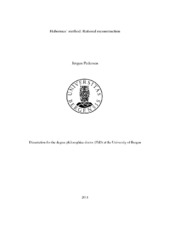Habermas' method: Rational reconstruction
Doctoral thesis
Permanent lenke
https://hdl.handle.net/1956/5041Utgivelsesdato
2011-10-07Metadata
Vis full innførselSamlinger
Sammendrag
This dissertation clarifies, discusses and elaborates on the method of Jürgen Habermas’ philosophical enterprise: rational reconstruction. The method is designed for a systematic reconstruction of the intuitive knowledge of competent subjects, as well as the collective knowledge of traditions. By explicating a normative content inherent in a set of different practices, a critical standard is established against which actual practices can be evaluated. In the first article, Habermas’ method: Rational reconstruction I describe the method’s main features, and based on this outline I demonstrate how the method is employed in two of Habermas’ research programs: formal pragmatics and the theory of social evolution. In the second article, Habermas and the political sciences: on the relationship between theory and practice, I demonstrate how Habermas unites theory and practice through a mode of analysis which is descriptive and normative at the same time. I then proceed to show how the method is employed in Habermas’ theory of deliberative democracy. In the third article, Social philosophy: a reconstructive or deconstructive discipline, I present the method of rational reconstruction as a key factor in Habermas’ transformation of the original program Horkheimer established for critical theory in the early 1930s. Horkheimer claimed that social philosophy should be normative and descriptive and at the same time establish a dialectical relationship between philosophy and the empirically oriented sciences. My argument is that rational reconstruction represents a fruitful transformation of this program. It enables the critical theorist to work both normatively and descriptively at the same time while the reconstructed core concepts also makes possible a dialectical relationship between philosophy and the social sciences. The concept of communicative action is a critical normative concept describing constitutive ideals which at the same time can be used to normatively assess the quality of discourse. Furthermore, the concept is increasingly being employed by empirically oriented political scientists thus establishing a dialectical relationship between the philosopher and the social scientist. This interpretation suggests that the very fact that reconstructed concepts are being taken up and used as starting points in empirical theories is a kind of corroboration of the theory. In the fourth paper, Justification and application: the revival of the Rawls-Habermas debate, I discuss the challenge from Rawls’ second major work, Political Liberalism. I defend Habermas’ against Rawls’ claim that his theory is comprehensive and thus not able to give a good account of political legitimacy for modern societies characterized by the fact of reasonable pluralism. I also demonstrate that Habermas’ theory of political legitimacy has some crucial advantages as a critical theory which is not to be found in Rawls’ conception. An implicit theme in the different articles which is made explicit in the introduction is the relationship between philosophy and empirical science. I argue that the research on Habermas has not managed to grasp what I refer to as the philosophy/science interplay due to its lack of focus on the methodological aspects of rational reconstruction. Thus, the proposal I defend is that reading Habermas through the lens of rational reconstruction provides an often missed opportunity to understand the complex relationship between philosophy and science in Habermas’ writings. This is important because of the promises it holds for the cooperation between philosophy and (social) science.
Består av
Paper I: Pedersen, Jørgen (2008): Habermas’ method: Rational reconstruction. In Philosophy of the Social Sciences, 38 (4): 457-485. Full text not available in BORA due to publisher restrictions. The article is available at: http://dx.doi.org/10.1177/0048393108319024. This is an elaborated version of Pedersen, Jørgen (2006): Habermas' rekonstruktive samfunnsvitenskap. In Norsk Filosofisk Tidsskrift, 41 (2):119-139. The article is available at: http://www.idunn.no/ts/nft/2006/02/habermas_rekonstruktive_-samfunnsvitenskap.Paper II: Pedersen, Jørgen (2009): Habermas and the political sciences: The relationship between theory and practice. In Philosophy of the Social Sciences, 39 (3): 381-407. Full text not available in BORA due to publisher restrictions. The article is available at: http://dx.doi.org/10.1177/0048393108329796. This is an elaborated version of Pedersen, Jørgen (2007): Habermas og statsvitenskapen: Rasjonell rekonstruksjon som metode. In Tidsskrift for Samfunnsforskning 48 (4):469-500. The article is available at: http://www.idunn.no/ts/tfs/2007/04/habermas_og_statsvitenskapen_rasjonell_rekonstruksjon_som_metode.
Paper III:Pedersen, Jørgen (2011): Social Philosophy. A reconstructive or deconstructive discipline? Forthcoming in Philosophy & Social Criticism. Full text not available in BORA. This is an elaborated version of Pedersen, Jørgen (2009): Sosialfilosofi: En rekonstruktiv eller dekonstruktiv disiplin? Habermas, Foucault, Honneth. In Agora. Journal for metafysisk spekulasjon, 27 (4):23-50.
Paper IV: Pedersen, Jørgen: Justification and Application. The revival of the Rawls-Habermas Debate. Forthcoming in Philosophy of the Social Sciences. Full text not available in BORA
